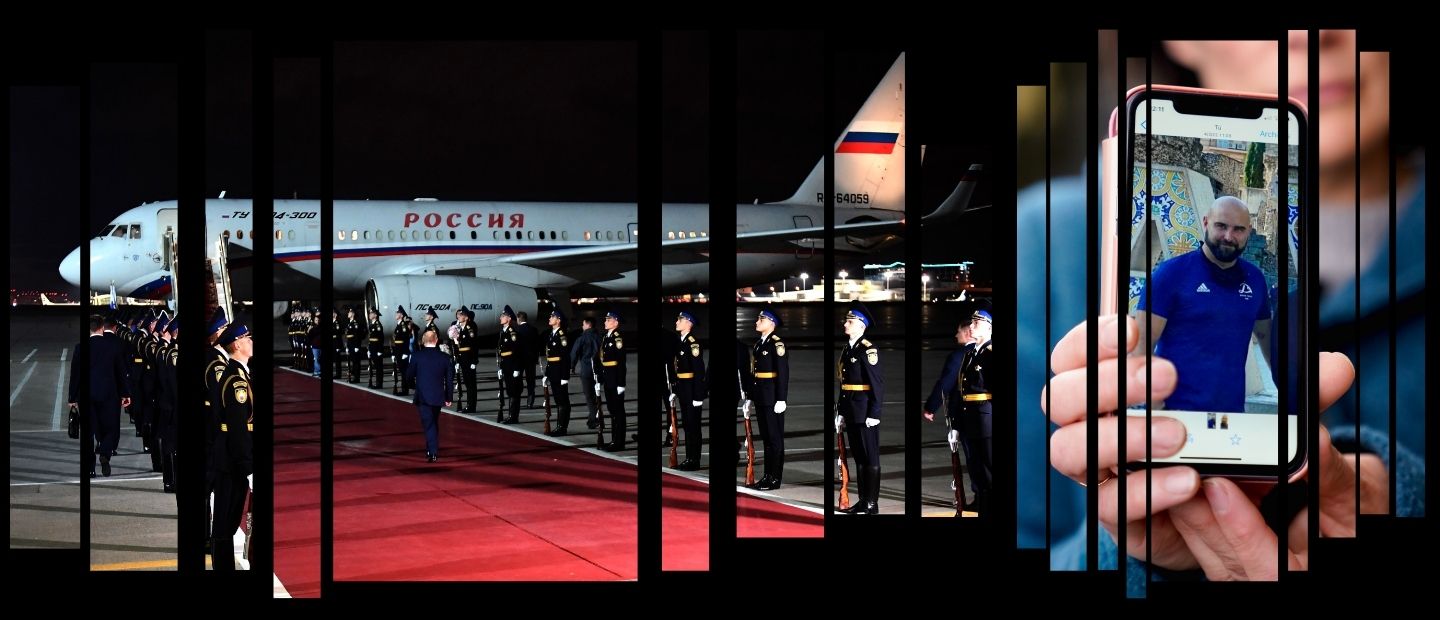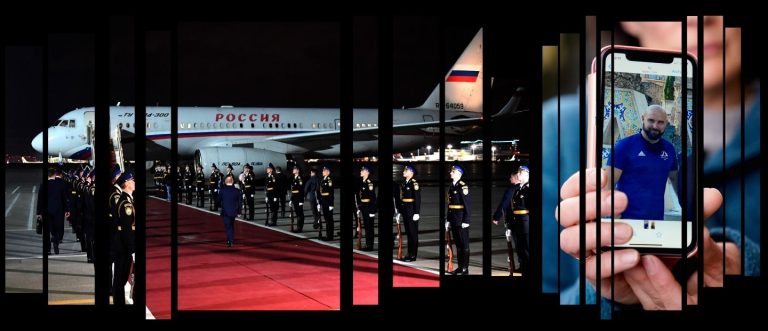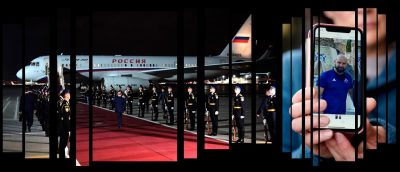Collaboration: Anastasiia Morozova, Daniel Flis, Wojciech Cieśla (FRONTSTORY.PL)
Michael Weiss (The Insider) 2024-08-12
Collaboration: Anastasiia Morozova, Daniel Flis, Wojciech Cieśla (FRONTSTORY.PL)
Michael Weiss (The Insider) 2024-08-12
- When ABW, the Polish internal security agency, detained Pablo González, the Russian spy was not alone: his partner, a Polish journalist, was also taken into custody. Since the winter of 2022, she has been charged with the crime of accessory to espionage, as confirmed to us by the Polish prosecutor’s office
- González’s then-partner is still under indictment but can move freely. She appears in the Polish parliament and writes about the situation at the Polish–Belarusian border. Those who inquire about her role in the spy case are threatened with legal action.
- The pair’s relationship, which lasted over two years, opened many doors for González. Here, we reveal how the undercover GRU officer built connections in Warsaw within a community of journalists, foreign correspondents, and activists. Meanwhile, a Spanish wife paid from Russia also appeared on the scene.
UPDATE (August 14, 2024)
Following our publication, the Polish National Prosecutor’s Office issued a press release announcing that an indictment has been filed against Pablo G. Y. a.k.a. Pavel R., and gives the true details of the person we described as Natalia K.
According to the prosecutor’s office, “The evidence regarding the remaining co-conspirators (including against charged Magdalena Ch.) was excluded for separate proceedings, which are continuing.”
Pablo Pablo G. Y. a.k.a. Pavel R. is accused of committing a crime under Article 130 § 2 of the Penal Code, as in effect until October 1, 2023, so that he faces a prison sentence of 3 to 15 years. “The defendant’s activities included acquiring and transmitting information, spreading disinformation, and conducting operational reconnaissance.”
A three-dimensional toy magnet on the fridge in the apartment kitchen changes pictures. From one viewpoint, it shows Putin’s silhouette, then, as the viewpoint changes, the face of the Russian president disappears.
This story is as strange and vague as the grotesque souvenir on the fridge in the Warsaw apartment. In fact, it was the country’s biggest spy scandal in decades: in the center of Poland, among foreign correspondents and Polish journalists, Pablo González was operating as a full-time GRU officer while pretending to be a journalist.
All of Poland heard about his arrest and expulsion, and moreover, there was global media interest in González. What no one knows is that there is an important element missing from the spy story: it involves someone else, too.
Moscow, Vnukovo Airport, August 2024. Vladimir Putin waits for a plane of Russian spies exchanged for political prisoners. The plane lands, and in the crowd on the tarmac appears the figure of a shaven-headed man in his forties. Pablo González, aka Pavel Rubtsov, spent the last two and a half years in Polish custody.

According to Polish intelligence services, he is a dangerous GRU officer. Videos of the landing in Moscow show Rubtsov shaking hands with Putin at the airport. Rubtsov smiles and nods. For this special occasion, he wore a t-shirt adorned with an image of a Star Wars stormtrooper and the slogan, “Your Empire Needs You.”
ABW Scans the Walls
Before being detained on the night of February 28, 2022, in a hotel in Przemyśl, Pablo González had been living and operating in Poland for over two years. That same night, Polish authorities also detained Natalia K. (whose name and initial we changed), a Polish freelance journalist, who also happened to be González’s partner. González was charged with involvement in foreign intelligence activities, while his partner was charged with accessory to espionage.
After the arrest, the Polish Internal Security Agency (ABW) searched the couple’s Warsaw apartment, which they had started to rent a month earlier. It was a scene straight out of a movie: a dozen officers scanned the walls with a portable X-ray, checking notebook pages with ultraviolet light. Polish counterintelligence agents secured equipment and external drives and found credit cards under González’s Russian name: Pavel Rubtsov. In his jacket pockets, they found receipts from Moscow.
In time, the prosecutor’s office discovered additional evidence: materials that González had gathered, ostensibly as a journalist, while spying on Zhanna Nemtsova, the daughter of the murdered Russian opposition leader.
Following his arrest, Pablo González was taken into custody, treated as a dangerous inmate, and isolated from other detainees for the first few months. He was facing a life sentence.
The Polish court did not agree to detain Natalia K. Was this because the prosecutor’s charges were too weak? That was the conclusion suggested by a local news site of the Wyborcza media group, the only outlet to date that has reported about the two people – that is, not just González – involved in the espionage scandal.
Only a handful of acquaintances and a few journalists even know that Natalia K. was detained. The couple’s Polish friends visited their shared apartment, but few were previously aware that González also used a Russian passport under the name Pavel Rubtsov. They are shocked to learn that the easy-going, fun-loving Pablo was a Russian spy.
For more than two years after the arrest, González was the only known suspect of the spy case in Polish and international media. Natalia K. quietly returned to the front lines of the news as a reporter. She never publicly mentioned her involvement in the case, although she was a speaker and panelist at various important events.
St. Petersburg: Vacation with an Agent
To fully understand Pablo González’s story, we must go back to the 1930s. After the defeat of leftist forces in the Spanish Civil War, Andrés González – Pablo’s grandfather and the son of Spanish Communists – went to the USSR, the homeland of the international revolution. Despite the purges Stalin regularly organized against non-Russian communists, Andrés successfully settled in the Soviet Union.
In the late 1970s and early 1980s, his daughter, María Elena González, met Alexei Rubtsov. In 1982, Pavel, who would later become Pablo, was born in Moscow. Following her divorce from Alexei in 1991 – the year the USSR collapsed – Maria and young Pavel moved to Spain. There, the boy adopted a Spanish version of his name: Pablo. However, he kept both his Spanish and Russian passports. Meanwhile, according to information from the independent Russian investigative outlet Agentstvo, Pablo’s father Alexei worked in Russian media in the late 1990s and was a manager at RBC, a Russian media group.
Fluent in Russian, Pablo completed his studies in Slavic languages in Spain and began working in journalism. We don’t know when or through whom he joined the GRU or what kind of training he underwent, but we now partially know the kinds of tasks he received.
The GRU, Russia’s military intelligence agency, is known for playing a unique role. Besides engaging in subtle spy games, it is responsible for the most brutal missions carried out abroad: assassinations, sabotage, disinformation, destabilization campaigns, poisonings, and coups. Much about GRU operations is shrouded in mystery. The West only became aware of the GRU’s scale of operations in 2018, after the assassination attempt on Sergei Skripal, a former Russian spy who had defected to the British side.
Of course, González-Rubtsov didn’t boast about his work for the GRU; instead, he traveled the world frequently disguised as a journalist, mostly publishing in Spanish periodicals. His frequent travel companion was photographer Juan Teixeira – they have known each other since 2011, and beginning in 2018, they ran the website Eulixe, where they published reports and articles from conflict zones around the world. By chance, these regions mainly included hotspots where the Russian Federation has interests: the Middle East, Donbas, and former Soviet countries.
Some pieces published on Eulixe also subtly align with Russian narratives.
The portal run by the two Spaniards was actually launched after Pablo took a trip from Moscow to St. Petersburg and back. According to Agentstvo, in June 2017, González traveled both ways on the same flight as GRU officer Sergei Turbin. Did they know each other? It seems certain: both men’s tickets were paid from the same account, in the same transaction.
Turbin is no minor figure in the GRU – as Christo Grozev from The Insider revealed, he is linked to the Fifth Department, which runs the “illegals” program. This involves Russian agents operating in the West under fictitious identities. Russia builds and maintains a network of “illegals” using people with complex and geographically dispersed family ties, like Pablo.
Mission: Spy on Nemtsova
Language skills and a friendly demeanor often open doors and facilitate connections. The cover of being a Spanish freelancer and holding a press card allowed Pablo González to travel freely to conflict zones, document events, and take photographs and recordings.
What does the GRU gain from these trips? González built contacts within journalistic circles and gathered information that could be useful to Russian intelligence. This was only one of the objectives: for Russian services, in addition to traditional espionage, influencing Western public opinion is crucial. The journalist’s publications and social media posts, which González wrote in Spanish and English, did not raise suspicions.
However, the GRU’s ambitions go beyond presenting “illegals” as reporters. Zhanna Nemtsova fled Russia and, since 2015, has been running a foundation in Germany named after her father (The Boris Nemtsov Foundation for Freedom). Pablo González enters her circle around 2016 – he is charming, friendly, and knows how to form close relationships. According to FRONTSTORY.PL sources familiar with the case, eventually, Nemtsova assisted Polish investigators in analyzing materials found on González’s laptop. In a conversation with the independent Russian investigative outlet Agentstvo in May 2023, Nemtsova confirmed that she has an agreement with Polish authorities that prevents her from discussing details of the case.
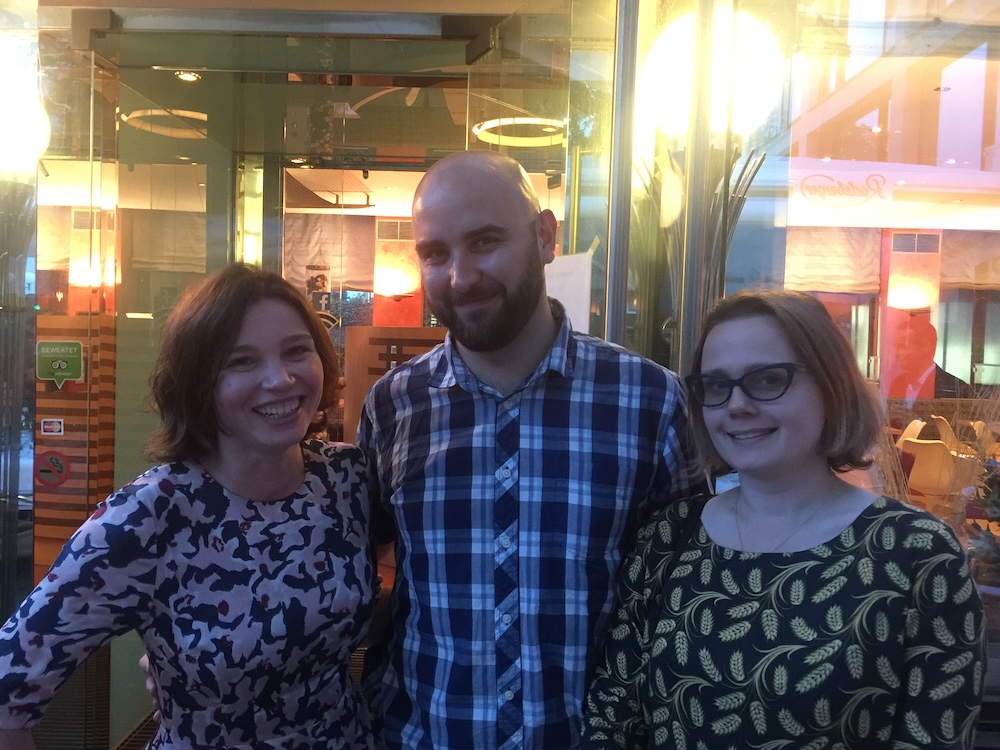
Gaining proximity to Nemtsova was a significant achievement for the GRU, as it allowed Putin’s services to infiltrate Russian opposition circles. In June 2017, González appeared in Bonn at the Boris Nemtsov Prize ceremony. According to Agentstvo, he asked one of the event participants to help with arranging an interview with opposition journalist Vladimir Kara-Murza (the interview appeared in the Basque leftist newspaper Gara), who was recovering after being poisoned by Russian services.
Seven years later, Kara-Murza would be one of the political prisoners Russia exchanged for González.
According to Spanish outlet El Independiente, since 2016, Spanish intelligence services have been keeping an eye out for a dyed-in-the-wool reporter with roots in Moscow. Also, around 2016, Pablo took part in a public event with Ilya Yashin, a Russian opposition figure. Yashin, one of the prisoners freed in the prisoner swap for spies, recently shared his suspicions on his Youtube channel that González was informing the Kremlin about his activities.
In the fall of 2019, González-Rubtsov appeared at a conference organized by Bonanza Media – an outlet that exists as part of a GRU-linked information operation – about the downing of flight MH17. Bonanza was aimed at undermining the findings of the international investigation, which showed that Russian services were responsible for the downing of the plane. The Bonanza program, as revealed by Bellingcat and The Insider, is overseen by high-ranking GRU General Andrei Ilchenko – who also happens to supervise the “illegals” program. Moreover, González-Rubtsov also published an article about the Bonanza Media conference on his own site.
Trip to Syria on Moscow’s Money
By the fall of 2019, González-Rubtsov was already embedded in Warsaw and operating in Poland. He formed a relationship with journalist Natalia K. (it is unclear exactly when they met). They rented an apartment in Warsaw and traveled together, often to conflict zones, just as Pablo had done before.
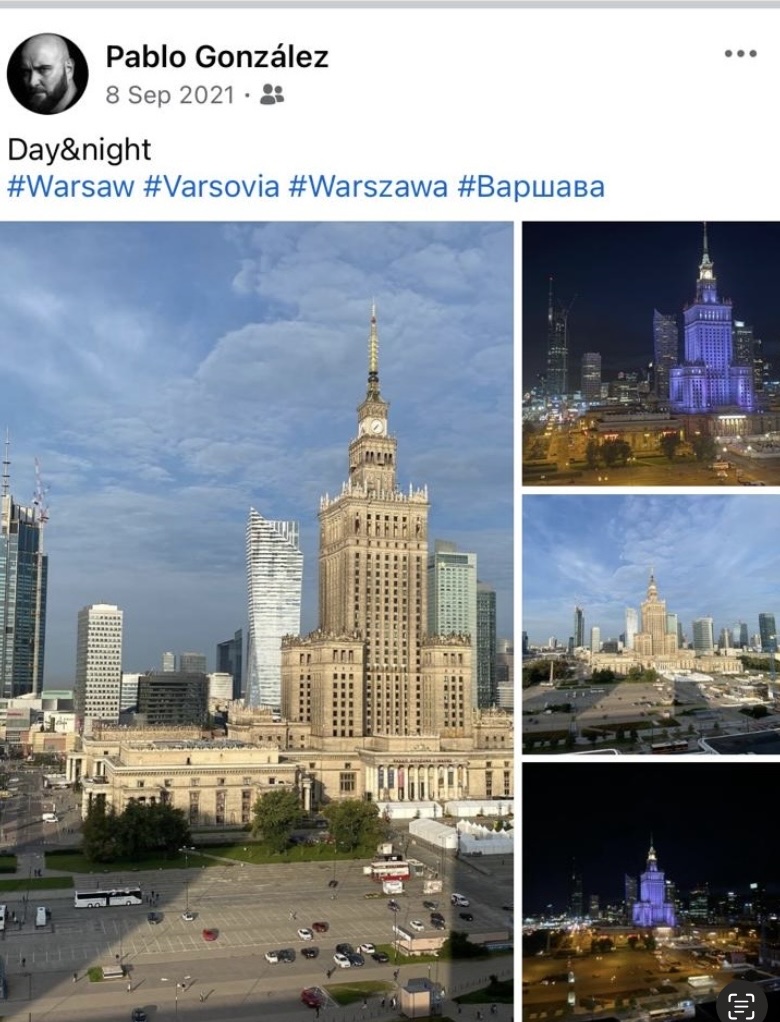
He published in Basque and Spanish media outlets (Gara, Público, laSexta) and collaborated with Voice of America and Deutsche Welle. Natalia K. – energetic and multilingual – reported on events from Poland and around the world for mainstream, and mainly international, media outlets. She had been traveling to Donbas and Ukraine for years, and also visited the Polish–Belarusian border, Nagorno-Karabakh, Senegal, and the West Bank. We do not know how many trips they took together as a couple, but they sometimes collaborated on topics together.
“She believed my legend” – this is what Pablo allegedly said in one of the conversations, intercepted by Polish national security services, according to El Independiente.
Immediately after arriving in Poland, González began creating a kind of legend for – and an aura around – himself socially in Warsaw. This allowed him to infiltrate journalist and foreign correspondent circles, as well as spend time with photojournalists and left-leaning activists. According to one of our sources in the Polish services, he also attempted to build relationships with right-wing business circles. In 2019, for example, he participated in a panel discussion at the Karpacz Forum. The topic? “The Long Shadow of Propaganda – Information Warfare with Ukraine and the West.” González argued that dialogue with Russia should be strengthened and that sanctions are unnecessary.
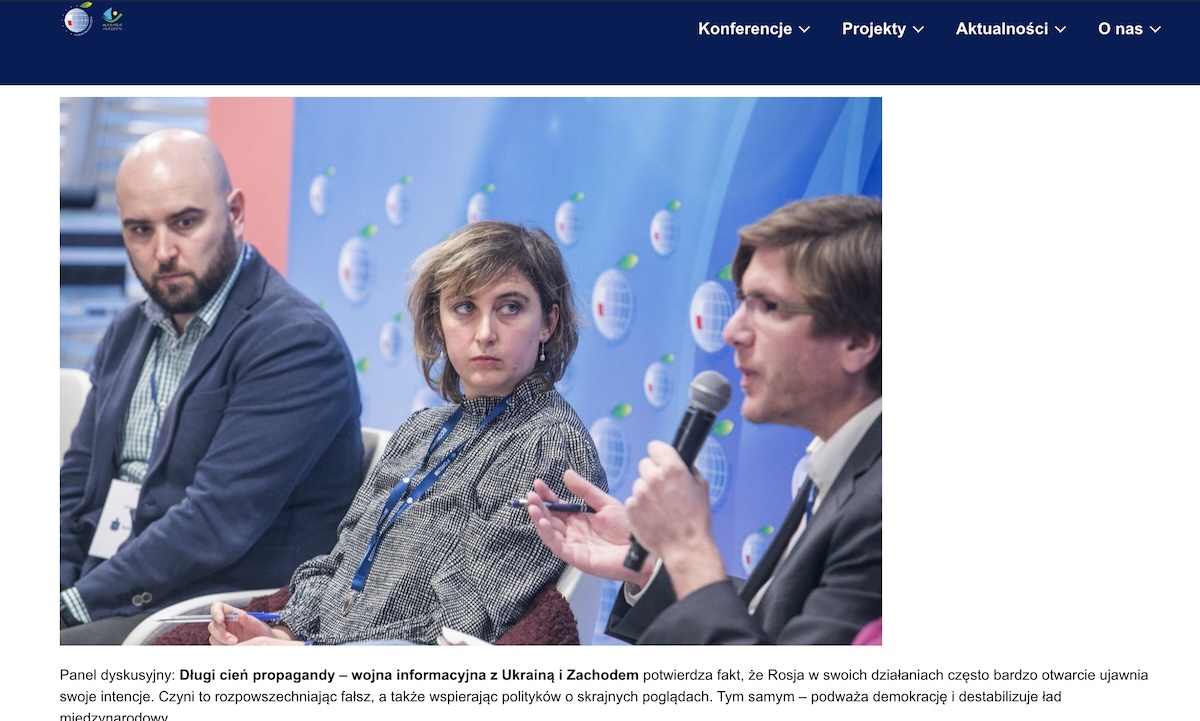
In 2019, González-Rubtsov also visited Syria. After returning from a trip organized by the Russian government, he published an encouraging article about Syrian-Russian relations, writing, “Moscow’s assistance strengthened Syrian forces and saved the lives of many soldiers.”
They knew everyone, and everyone knew them. Friends, including those from the media world, frequently visited Natalia and Pablo’s Warsaw apartment. English was often the language of discussion. Correspondents dropped by, and activists came to chat. One acquaintance, who wishes to remain anonymous, recounts: “Looking back now, I see it differently, but sometimes someone would run out of power on their phone or laptop. On work trips, there was always a lot going on, with chargers and power banks flying around. Now I wonder if he might have been downloading data from us or surveilling someone.”
González also enjoyed attending photography festivals. Online, one can find his photos from FotoCamp (2020), where he wore a VIP badge. He was interested in documentary photography.
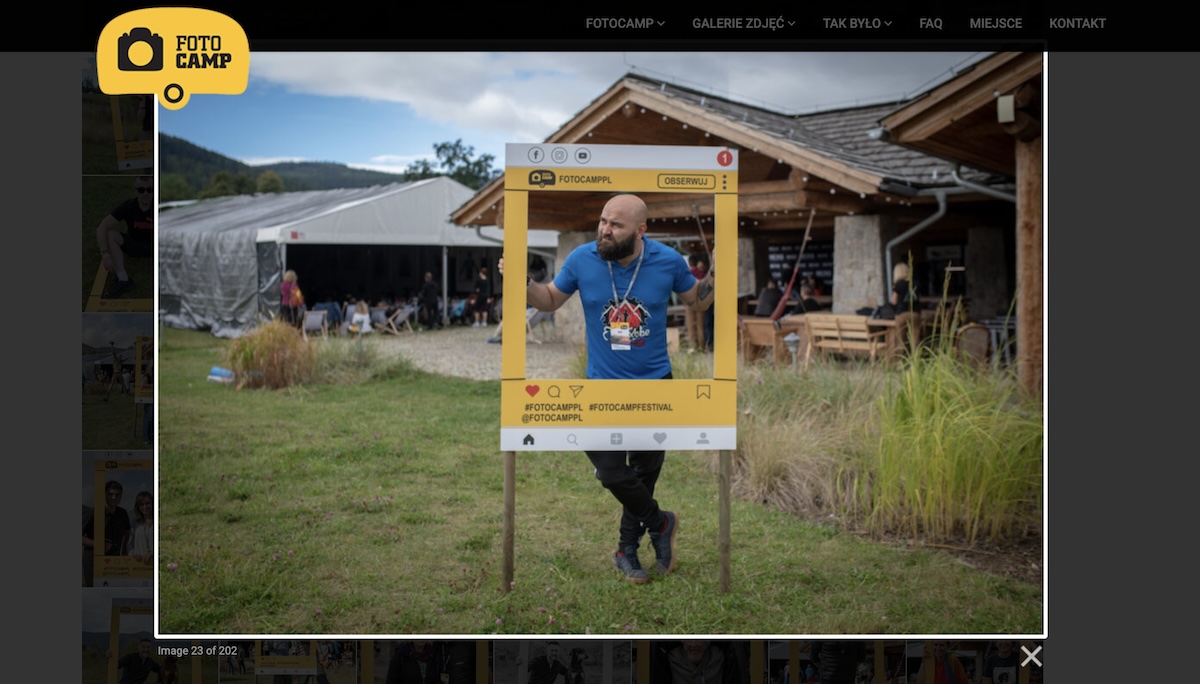
“Thanks to his relationship with Natalia, he had access to various contacts, went out for drinks with correspondents, built relationships, and gained trust,” remembers another person from Pablo and Natalia’s circle.
“Nice, impossible to outdrink, leftist views,” characterizes another.
An acquaintance of Natalia and Pablo (who, like all others, wishes to remain anonymous) recalls: “Sometimes he recorded videos, interviews, took photos, saying it was for the Spanish media. I don’t know what he eventually published, we didn’t pay attention to it.”
From Stalin to Navalny
Pablo – or at least Pablo as he presented himself in Warsaw – is a staunch Star Wars fan and an admirer of the sinister Empire. “The dark side of the Force,” he was known to argue, “fought for order in the Galaxy.”
No one noticed the red flags, even though what González wrote while living in Poland was quite intriguing.
In 2019, he wrote for Eulixe about Ukrainians’ disappointment with Maidan, the elections in Ukraine (mentioning possible electoral fraud), and the strong divisions and unrest in society. He analyzed elections in Poland and Spain, and criticized Normandy format meetings. In 2020, he published an article questioning World War II history in a way that was consistent with the Kremlin’s narrative, alleging that Poland contributed to the war by pursuing aggressive policies toward the USSR. The article even ended with a quote from Stalin. He also published an analysis of Navalny’s poisoning, hypothesizing that Russians were not behind it (shortly thereafter, Bellingcat revealed the composition of the Russian hit squad that tried to kill Navalny with Novichok).
In an interview with a Spanish news site, he downplayed the famous Navalny Foundation investigation into Putin’s palace, considering it “childish and for a naive audience”: “I have no doubt that the President of Russia has many wealthy acquaintances – but was this palace paid for with public money? No. It was bought by private individuals with their own money, which they presumably earned honestly, albeit with the Kremlin’s favor.” In the same interview, he talked about Nazis in Ukraine and how Poland does not want a strong Ukraine because it dreams of “Poland from sea to sea.”
González was effective, even managing to publish an article in a prestigious Polish magazine. In October 2020, he published a text on Eulixe about Syrian refugees in Nagorno-Karabakh, while at the same time, an article on the same topic appeared in “Tygodnik Powszechny,” the aforementioned distinguished Polish periodical.
The situation in Nagorno-Karabakh was escalating then, with Russian troops lining up on the Armenian border. One correspondent who met González-Rubtsov in Stepanakert recalls: “He was nice but behaved distantly. He arrived early and showed us local pubs because it was hard to get food. He worked in Stepanakert for three days, and then, to my surprise, suddenly went to meet with the Armenian Prime Minister. This was strange because the situation was tense, and it was difficult to arrange interviews with anyone.” Gonzalez published an interview with Nikol Pashinyan in the Spanish outlet EFA, in which the Armenian PM explained that there was nothing concerning about the presence of Russian soldiers at the border.
In the fall of 2021, González continued to report on the war in Karabakh and protests in Kazakhstan. He also traveled to the Polish–Belarusian border, reported on the refugee crisis and Polish women’s protests, appeared at the Karpacz Forum (for the second time), posted a photo outside the headquarters of the conservative Radio Maryja station, and conducted an interview with people from Ordo Iuris, the influential Polish ultra-conservative organization.
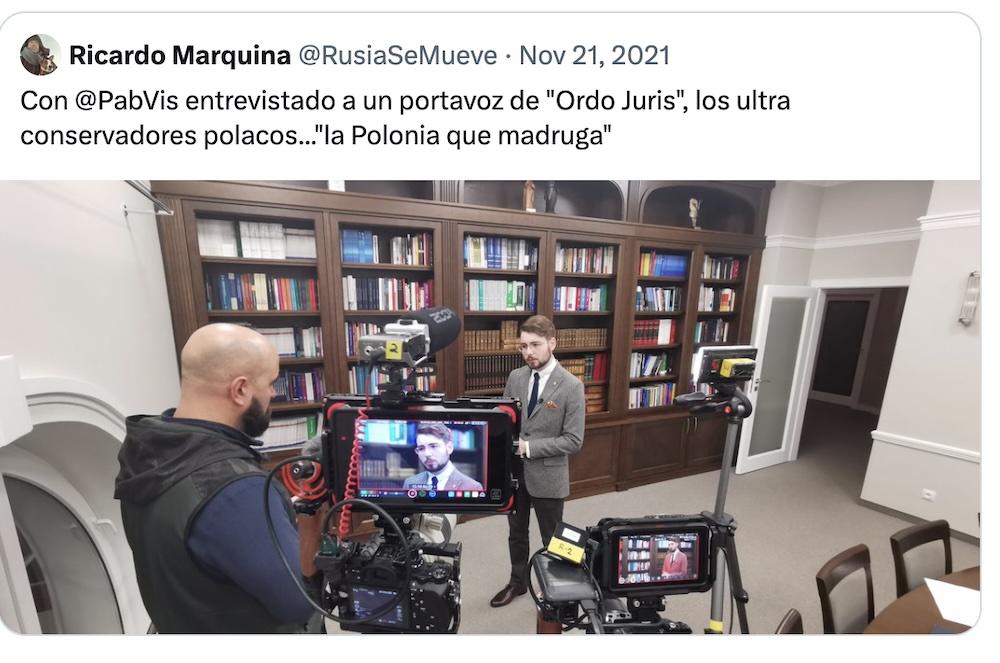
My Boyfriend, the Russian Spy
In late 2021 and early 2022, things were getting tense around González-Rubtsov. The Spanish services already know about his activities; the British MI6 and the Polish ABW did, too. The net tightened further when, in early February 2022, shortly before the war, González was detained near Donbass by the Ukrainian SBU while recording a video that was allegedly meant for live TV – for which the camera was set so that military equipment and Ukrainian soldiers were in the frame.
The SBU took away his passport and phone and ordered him to go from the front line to Kyiv for interrogation. There, González-Rubtsov was given a wolf ticket, told to leave the country immediately.
We have good reasons to believe that even before the full scale Russian invasion started, Natalia K. began to have suspicions about whether her partner was collaborating with Russian intelligence services (At this stage, FRONTSTORY.PL is unable to reveal more about the source of this knowledge). However, we don’t know what she did with those suspicions. When we asked her about it a few days ago, she threatened to bury us with costly lawsuits if we revealed her name.
Since the couple’s arrest on the night of February 28, 2022, Natalia K. has been charged as accessory to espionage, although the case has not gone to court. Will Pablo González-Rubtsov’s return to Moscow change anything? The spokesperson of the Polish National Prosecutor’s Office gave us a brief response: “She faces charges of accessory to a crime under Article 130, Paragraph 1 of the Penal Code. Proceedings in this matter are continuing normally.” (When asked what will formally happen to the González investigation after his exchange, the prosecution declined to answer).
Dr. Piotr Kładoczny of the Polish Helsinki Foundation for Human Rights emphasizes that “accessory” in Polish law can be interpreted broadly: “Criminal law provisions should be clear, but here the boundaries are very blurred. Anything can be considered accessory – a person who licked and stuck stamps on a letter containing a defamatory anonymous message was convicted of accessory and fined 5,000 zlotys (approx. €1150). With a bit of scrutiny, anything that helps in espionage can be considered accessory, provided the aide is aware of whom they are helping and that their actions serve espionage.”
In other words, Polish prosecutors could only charge Natalia K. with this type of crime if they gathered evidence that she was fully aware she was helping a foreign spy, as this crime cannot be committed unwittingly.
Aside from the couple’s acquaintances, who believe that Natalia was a victim of an unfortunate love affair, no one has heard about the investigation. After González’s arrest, Natalia defended her partner in informal conversations, downplayed the prosecutor’s findings, and arranged for books to be sent to him in jail.
According to Spain’s El Independiente, Natalia K. did not know until after Pablo’s arrest that he was not divorced, and that his “former”wife, with whom he has three children, is still legally his spouse. Initially, the Polish journalist girlfriend was even allegedly organizing money for González’s lawyers. It was only in recent months that she began to distance herself from González, multiple of her friends told FRONTSTORY.PL on condition that they remain anonymous.
By winter 2022, Natalia K. was already back on the front lines of news reporting. She never publicly mentioned the charges against her, although she participated in public debates at important events. She was present doing reporting in the Polish Sejm, reported on the situation at the Polish–Belarusian border, attended a NATO conference, and discussed the current political situation in Poland for foreign media.
There is no indication that the editors she worked with at various international outlets knew about the charges against her in the espionage scandal.
#FREEPABLO, a Russian Info Ops
Even after the arrest, González’s Polish acquaintances doubted his guilt – especially activists who had experienced the actions of controversial Polish Minister of Justice and Prosecutor General Zbigniew Ziobro’s prosecutor’s office firsthand. González ended up behind bars at a time when independent journalists in Poland were under attack from the government, intelligence services, and right-wing propagandistic media. Politicians were accusing each other of serving the Kremlin’s interests.
Doubts were fueled by the fact that the investigation dragged on; even after two years, the case had still not gone to court. To some activists and Western journalistic organizations, the narrative of an unjustly imprisoned “Spanish reporter” took hold.
Shortly after the arrest, the #FreePablo campaign launched online: a website and social media accounts were created, featuring reports of González’s allegedly unfounded arrest. This disinformation operation aimed to “cleanse” the image of the undercover GRU officer in the West, among journalists and intellectuals – many of whom indeed signed a letter in his defense – and to create confusion and uncertainty.
The campaign was effective. Spanish media covered the story extensively, and organizations defending journalists’ rights, led by Reporters Without Borders (RSF), issued strongly worded statements. The Catalan parliament, controlled by secessionists, demanded González’s release, while politicians from Spain’s far-left regularly advocated for him.
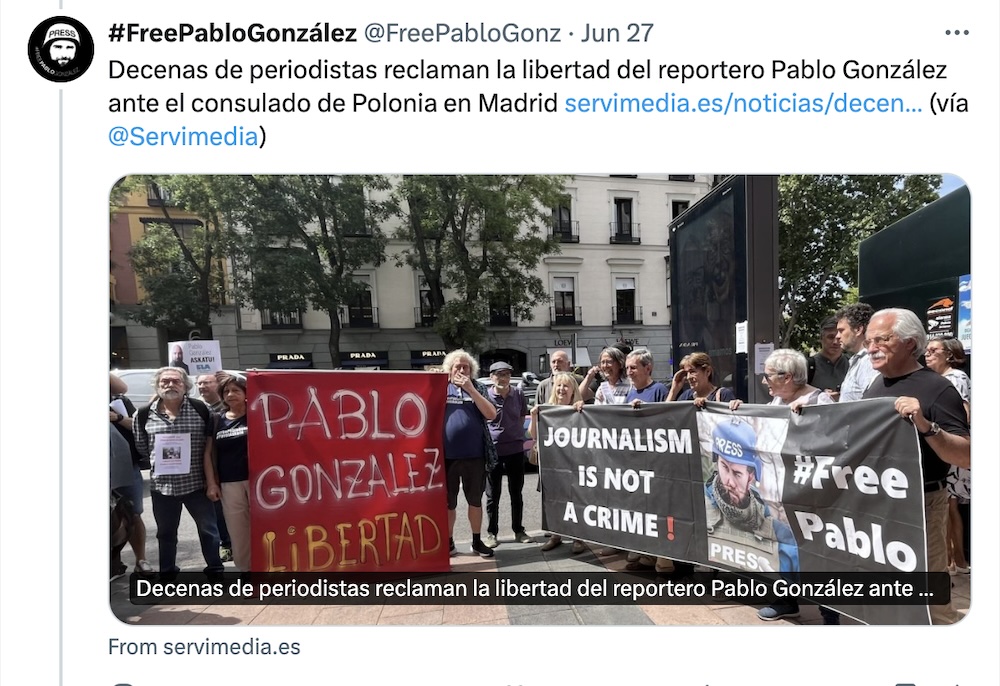
The Spanish foreign minister long avoided commenting on the matter but eventually acknowledged that the charges against González were indeed very serious – which prompted further attacks from González’s defenders and Catalan secessionists.
A month before the exchange of Western prisoners for Russian spies, the hashtag #FreePablo generated 244 mentions with a reach of 2.6 million, according to data from Brand24, a social media analysis tool. However, analysis of the site freepablogonzalez.org and the domain it redirects to led nowhere – the real domains are hidden behind so-called anonymizing intermediaries.
Juan Teixeira, González’s friend, travel companion to Donbas, and co-creator of the Eulixe portal, led the #FreePablo campaign. He worked with an organization that collected money and signatures for petitions in González’s defense. In Teixeira’s social media posts, analyzed by Info Ops Foundation researchers, we found posts indicating anti-American, anti-Israeli, pro-Palestinian, and far-left revolutionary views.
Kamil Basaj, a disinformation expert from the Info Ops Foundation (Poland), explains: “Influence operations are standard practice for Russian intelligence. They can serve to confuse and obscure – and that’s how the #FreePablo campaign can be assessed. It meets many criteria of a planned deception operation, which is planned early as part of the legend on which an agent operates in the West.” According to Basaj, the online campaign is aimed to shape the image of González-Rubtsov as a “journalist.”
Moreover, after the arrest, another person appeared on the scene, whose existence was previously mostly unknown to González’s Polish circle: It was González’s legal partner and the mother of his children, Oihana Goiriena, who quickly became involved in the campaign in Spain. She regularly gave media interviews. Meanwhile, according to El Independiente, Goiriena received monthly transfers from Moscow from Rubtsov’s father.
However, the real driving force behind the campaign was González’s influential lawyer, Gonzalo Boye. He frequently appears in cases with Russian threads dangling in the background – he is also the lawyer of former Catalan leader Carles Puigdemont, who sought military and financial support from Russia for Catalonia’s secession.
An OCCRP-led investigation by journalists revealed that, on the eve of the Catalonia independence vote in 2017, Puigdemont met in Barcelona with Russian diplomat Nikolai Sadovnikov, who, on behalf of Russia, reportedly offered economic and military assistance for an independent Catalonia in exchange for regulations favoring the use of cryptocurrencies.
In Spain, an investigation into the connections between Catalan separatists and the Kremlin is underway – both Puigdemont and lawyer Gonzalo Boye, who visited González in Radom prison, are involved.
After González’s release to Moscow, Boye expressed on Russia Today that a “humanitarian exchange of journalists” had taken place. Meanwhile, Puigdemont recently appeared in Catalonia for one day and then disappeared – the Spanish police are searching for him.
Due to Secrecy
Everyone has heard about González’s arrest and expulsion. But Natalia K.’s involvement? Hardly anyone is even aware of it. Why is this element missing in a case that was so widely covered?
To piece together this puzzle, we met with Natalia K. What was her role and status in the investigation? When she heard our questions, she ended the conversation and threatened us with a lawsuit.
“You’re a journalist. Do you think it is possible to tell Pablo’s story without describing your relationship?” we asked her.
Natalia remained silent. A few days later, she replied to us in an email: “In response to your questions, I inform you that due to ongoing proceedings, my personal data (or data that may reveal my identity) must remain confidential. Additionally, due to the ongoing investigation and its confidentiality, I cannot provide you with any information. Please direct all inquiries to the Prosecutor’s Office.”
The couple’s friends, who long believed in Pablo’s innocence, are devastated after seeing the scene of González landing in Putin’s embrace at Vnukovo airport: “I drank vodka with a GRU spy. What a mindfuck.”
Many of them reflect on their meetings with Pablo, visits, shared topics, and whether they accidentally charged their phones in his presence.
But time erases details. Today, no one even remembers what image appeared on the other side of the Putin magnet that hung on Natalia and Pablo’s fridge.
Author: Anna Gielewska
Collaboration: Anastasiia Morozova, Daniel Flis, Wojciech Cieśla (FRONTSTORY.PL), Michael Weiss (The Insider)
Contribution to the research in Spain: Jose Javier Olivas Osuna, UNED (National University of Distance Education)
Cover illustration:LEFT Russian President Vladimir Putin greets freed Russian prisoners at Vnukovo airport, Moscow, Aug. 1, 2024. Credit: Kremlin.ru. RIGHT: Oihana Goiriena, wife of journalist Pablo Gonzalez, shows a picture of her husband on her phone, after he was detained by Polish authorities on espionage charges, in Nabarniz, Spain, March 5, 2022. Credit: VINCENT WEST / Reuters / Forum
The Polish version of this story was published on FRONTSTORY.PL.
Subscribe to Goulash, our original VSquare newsletter that delivers the best investigative journalism from Central Europe straight to your inbox!
Anna Gielewska is co-founder and editor-in-chief of VSquare and co-founder of Polish investigative outlet FRONTSTORY.PL. She is also vice-chairwoman of Fundacja Reporterów (Reporters Foundation). A journalist specializing in investigating organized disinformation and propaganda, Gielewska was the John S. Knight Fellow at Stanford University (2019/20) and has been shortlisted for the Grand Press Award (2015, 2021, 2022) and the Daphne Caruana Galizia Award (2021, 2023). She was the recipient of the Novinarska Cena in 2022.

